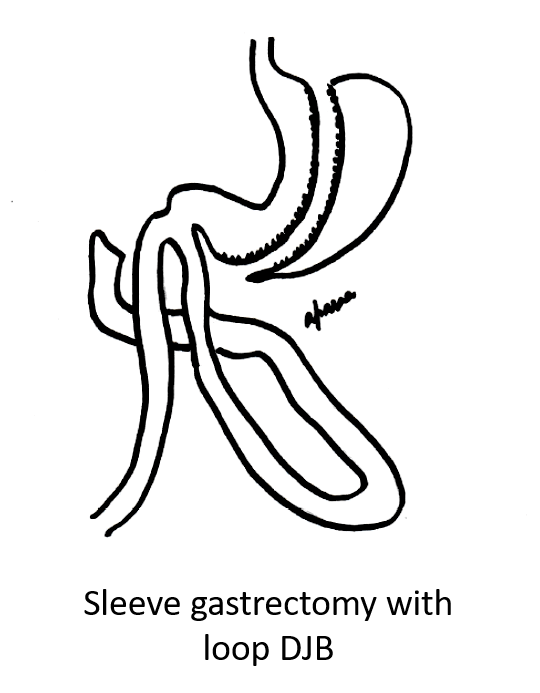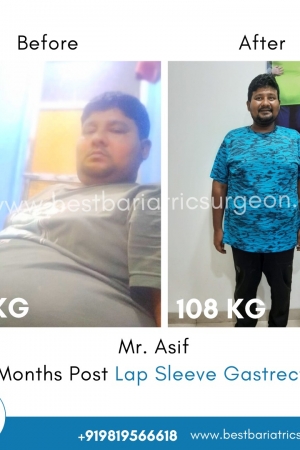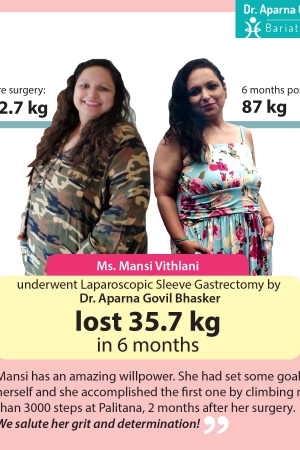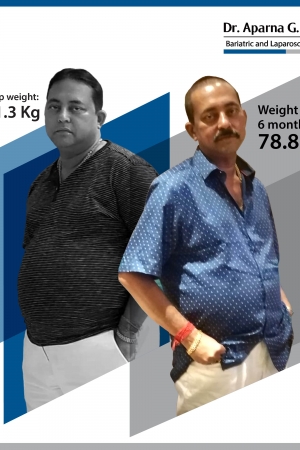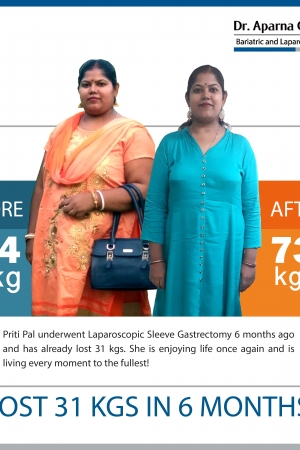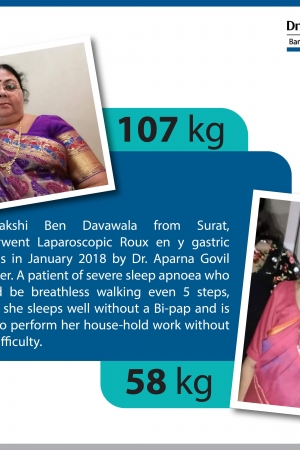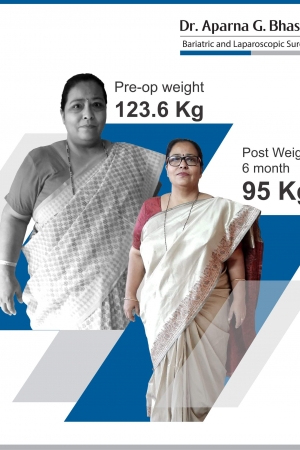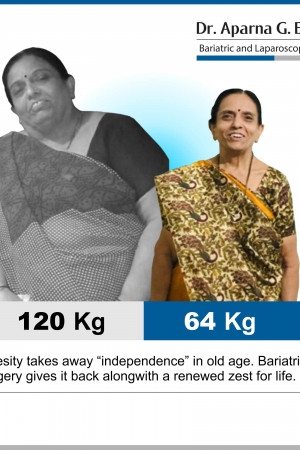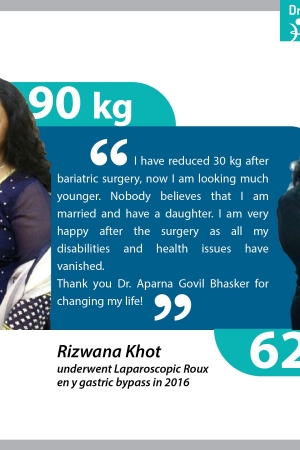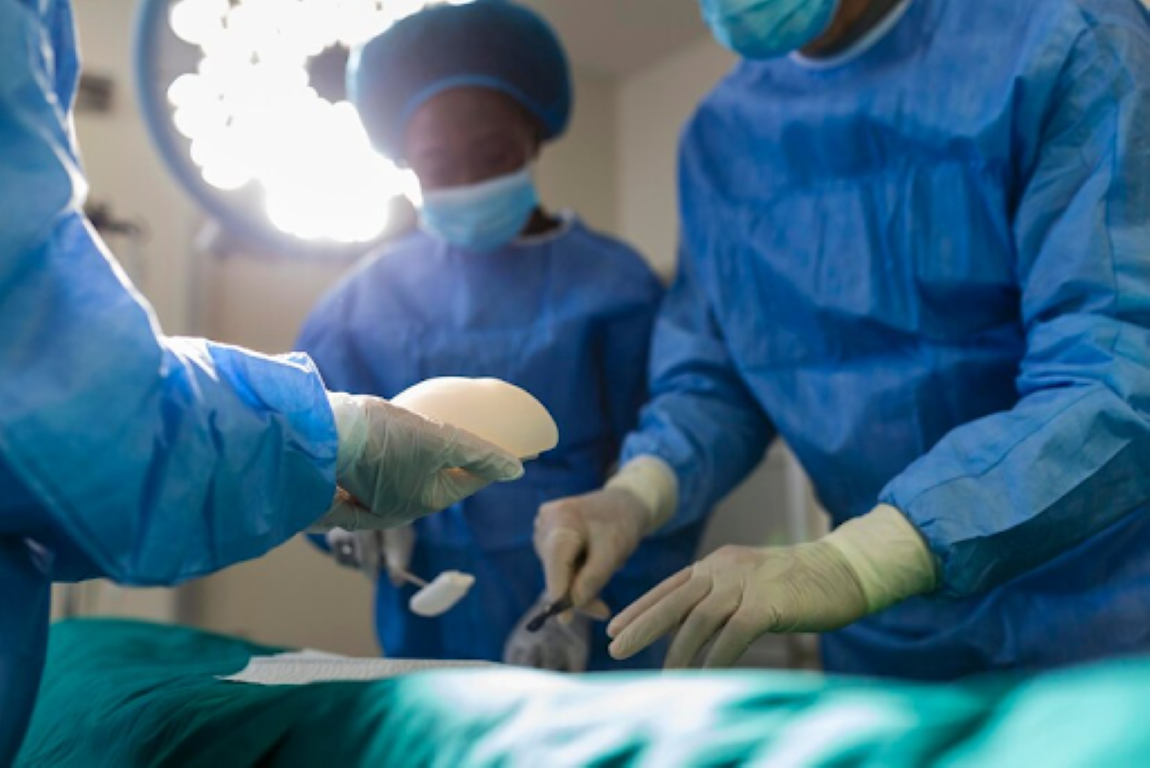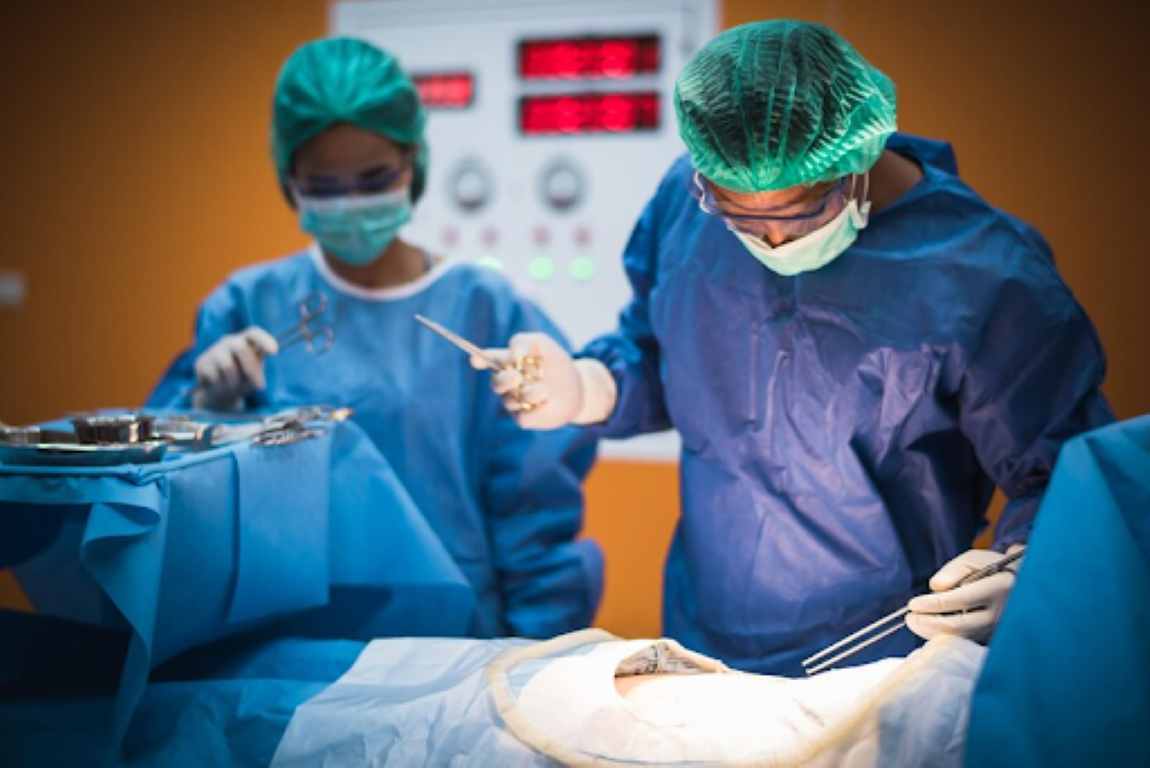
Laparoscopic Sleeve Gastrectomy with Duodeno-Jejunostomy Surgery in Mumbai
- Home
- Laparoscopic Sleeve Gastrectomy with Duodeno-Jejunostomy Surgery in Mumbai
Laparoscopic Sleeve Gastrectomy with Duodeno-Jejunostomy Surgery in Mumbai
Laparoscopic Sleeve Gastrectomy with Loop Duodeno-Jejunal Bypass
Laparoscopic sleeve gastrectomy with loop duodeno-jejunal bypass surgery is one of the newer bariatric procedures.
As per the IFSO-APC guidelines, if your BMI is more than 37.5 Kg/m2 (BMI- weight in kg/height in m2), you can undergo a bariatric surgery in the absence of any associated illnesses.
Laparoscopic sleeve gastrectomy with loop duodeno-jejunal bypass surgery is one of the newer bariatric procedures.
As per the IFSO-APC guidelines, if your BMI is more than 37.5 Kg/m2 (BMI- weight in kg/height in m2), you can undergo a bariatric surgery in the absence of any associated illnesses. You can also undergo bariatric surgery if your BMI is ≥ 32.5 Kg/m2 and you have 2 or more obesity associated diseases like type 2 diabetes, high blood pressure, high cholesterol etc. As per the new DSS guidelines formed by a group of international diabetes federations in London, bariatric/metabolic surgery may also be considered as a treatment option for control of diabetes in patients with class I obesity (BMI- 27.5-32.5 Kg/m2) if their diabetes is poorly controlled.
In built formula for calculating BMI
Laparoscopic sleeve gastrectomy with loop duodeno-jejunal bypass surgery
Laparoscopic sleeve gastrectomy with loop duodeno-jejunal bypass surgery is a surgical procedure in which a sleeve of stomach is created using staplers. After this, a loop of the part of small intestine called the jejunum is joined to the first part of duodenum. When food is consumed, it comes via the food pipe into the stomach sleeve and then directly enters the small intestine. About 150 to 200 cm of jejunum is bypassed in this surgery.
Mechanism of action of laparoscopic sleeve gastrectomy with loop duodeno-jejunal bypass surgery
Laparoscopic sleeve gastrectomy with loop duodeno-jejunal bypass leads to weight loss by a combination of multiple mechanisms. First of all, because reduced size of the stomach, you will not be able to eat too much and your intake will be restricted. Secondly, you will feel full even after eating small quantities and will feel satiated much earlier. Thirdly, “ghrelin” the hunger inducing hormone which is produced from the fundus of the stomach, does not come in contact with the food and hence the sensation of hunger is curbed to a large extent. Fourthly, as first part of intestine is bypassed, this surgery also leads to some degree of mal-absorption. In addition to this there are GI hormones that play a big role in weight loss as well as control of diabetes. There are also other factors like bile acids, gut microbiota and certain unknown factors that augment the effect of surgery.
Expected results after surgery
Bariatric/metabolic surgery is the only proven method for sustained weight loss in people suffering from clinically severe obesity. Most bariatric procedures will lead to an excess weight loss to the tune of 65 to 75% over a period of 18 to 24 months. This weight loss journey is a partnership between the doctor and the patient and the results depend on the level of commitment from either party. All bariatric procedures lead to a significant improvement in type 2 diabetes, high blood pressure, high cholesterol, gout, obstructive sleep apnoea, venous thrombo-embolism, PCOD, infertility and many other diseases related to obesity. Weight loss leads to a significant decrease in the risk for heart disease also. Overall, bariatric/metabolic surgery leads to a marked improvement in health, quality of life and confidence of the patient.
Advantages of a laparoscopic sleeve gastrectomy with loop duodeno-jejunal bypass surgery
This procedure leads to almost the same outcomes as a laparoscopic Roux en y gastric bypass surgery. However, a larger portion of stomach is left behind in this surgery. This may lead to lesser nutritional deficiencies and ability to eat larger volumes of food as compared to a Roux-en y gastric bypass. The stomach is available for endoscopic surveillance and this is the reason for the popularity of this procedure in countries like Japan and Korea where the incidence of stomach cancer is high.
Cost of a laparoscopic sleeve gastrectomy with loop duodeno-jejunal bypass surgery
This surgery requires a lot of disposable equipment in the forms of stapler guns, trocars, cartridges, energy sources etc. The cost also depends on the number of days you need to stay in the hospital, type of room that you select as well as the hospital in which you get operated. The doctor will guide you about the cost after assessing and evaluating all the above details.
Laparoscopic sleeve gastrectomy with loop duodeno-jejunal bypass surgery FAQ’s (Frequently Asked Questions)
How much weight loss is expected after a laparoscopic sleeve gastrectomy with loop duodeno-jejunal bypass surgery?
Weight loss is a gradual process after this surgery. You will lose weight quite fast in the first 3 to 4 months after which, weight loss slows down. You will continue to lose weight for about 12 to 18 months after your surgery and can expect to lose about 65 – 75% of your excess weight.
It is important to note that bariatric/metabolic surgery is a tool that pushes you into a lifestyle change. While bariatric/metabolic surgery helps to lose massive amount of weight, it is also important to exercise every day and follow a healthy diet. Our experience shows that patients who embrace the lifestyle change along-with surgery, tend to do much better in terms of weight loss and weight maintenance.
- Does diabetes improve after a sleeve gastrectomy with loop duodeno-jejunal bypass surgery?
This surgery is known to lead to improvement in type 2 diabetes. It has been observed that a lot of patients do not need to go back on their anti-diabetic medications after the surgery. For those who need to continue medications, the dose is reduced considerably and a lot of times patients who have been on insulin may not require it post-operatively. The outcomes of diabetes remission depend on a lot of factors like the duration of diabetes, type of diabetes (type 1/type 2), age of the patient, c-peptide levels, use of insulin etc. It also leads to improvement in other associated diseases like high blood pressure, high cholesterol, obstructive sleep apnoea, gout, joint diseases, PCOD, infertilty etc. The overall risk for heart disease goes down considerably due to significant weight loss and overall improvement in associated co-morbidities.
I am diabetic but not overweight or obese. Am I eligible to undergo a laparoscopic sleeve gastrectomy with loop duodeno-jejunal bypass surgery?
This surgery has been shown to lead to remission or improvement in obese diabetics. Most often their blood sugars come under control within a few months of surgery and a lot of times patients do not need to take medications.
If you are a diabetic but you are not overweight or obese, the chances are that this surgery may not help you for improvement of diabetes. The latest DSS guidelines recommend metabolic surgery for patients with a BMI greater than 27.5 kg/m2 if their diabetes is uncontrolled despite best medical management. Presently, there is no evidence to recommend bariatric/metabolic surgery to a diabetic patient with a BMI less than 27.5 kg/m2.
What kind of preparation is needed before a laparoscopic sleeve gastrectomy with duodeno-jejunal bypass surgery?
Once you see the doctor, you will need to undergo investigations and medical checks for fitness. Additionally, you may need to see a chest physician, an endocrinologist, a nephrologist or a cardiologist, based on your clinical profile. You will also need to be on a high protein liquid diet for about 5 to 7 days prior to surgery. We would want you to lose atleast 3 to 5 kg before you undergo any bariatric/metabolic surgery. This also helps to reduce the swelling on the liver, and makes surgery easier for the surgeon and in turn, safer for you. In a way, it is also a test of your compliance for long term follow up. It has been seen that patients who follow the pre-operative diet well, tend to get better results after any bariatric/metabolic surgery.
How long does the laparoscopic sleeve gastrectomy with duodeno-jejunal bypass surgery take?
You will be admitted to the hospital one day before the surgery or in special cases as per the advice of the doctor. The surgery typically takes about 90 to 120 minutes to perform depending on the grade of difficulty. You are encouraged to walk within 4 to 6 hours of surgery. Most patients get discharged the next day, of course it will depend on your clinical condition and the doctor’s decision.
What kind of follow up is necessary after laparoscopic sleeve gastrectomy with duodeno-jejunal bypass surgery?
Follow up is the most important part of any bariatric/metabolic surgery. You will need to see Dr. Aparna Govil Bhasker 7 days after your surgery. After this in the first year, you need to do your tests and visit at 3 months, 6 months and at the end of 1 year. Post 1 year, all patients need to get investigated once a year and visit the centre for a check up. Life long follow up is advised after all bariatric/metabolic surgeries.
What kind of dietary changes will I have to follow after laparoscopic sleeve gastrectomy with duodeno-jejunal bypass surgery?
After the surgery you will be on liquid diet for 15 days followed by soft diet for the next 15 days. You can commence normal home food after a month of surgery but it will be restricted in quantity. The nutritionists will guide you at every step and will be there to answer all your queries. You will need to avoid high calorie foods, fired food, sweets and alcohol.
Will I be on medications after laparoscopic sleeve gastrectomy with duodeno-jejunal bypass surgery? If yes, for how long?
After any bariatric/metabolic surgery, you need to be on nutritional supplements. There are two reasons for that. Firstly, your intake will reduce considerably and secondly after a laparoscopic sleeve gastrectomy with loop duodeno-jejunal bypass surgery you will not absorb certain nutrients due to its mal-absorptive component. You may also need to be on other medications as advised by the doctor based on your clinical profile.
What are the side effects of a laparoscopic sleeve gastrectomy with loop duodeno-jejunal bypass surgery?
This is a safe surgery in good hands. Although it is more difficult to perform as compared to other bariatric procedures, its complication rates are much lower when compared to other major surgeries like cardiac bypass or surgery of the food-pipe or many other cancer surgeries. In the internet savvy world of today, google search will bring up a host of complications but its best if the doctor discusses this in person with you during your consultation.
Is one allowed to smoke after laparoscopic duodeno-jejunal bypass surgery?
Smoking is a contra-indication for laparoscopic duodeno-jejunal bypass surgery. If you are a smoker, you need to give up smoking completely atleast 15 days prior to undergoing surgery. If you are not confident about being able to stop smoking altogether, then our advice is that you must not undergo bariatric surgery, in order to avoid serious complications in future.
Can one regain weight after laparoscopic duodeno-jejunal bypass surgery?
Long term weight maintenance after laparoscopic duodeno-jejunal bypass surgery depends on a host of factors. Some degree of weight regain has been observed in the long term after any bariatric/metabolic surgery. It is imperative to exercise and bear moderation in diet after the surgery.
Who should not undergo this surgery?
If you have acid reflux (GERD) or hiatus hernia you must not undergo this procedure. In that case a Roux-en y gastric bypass will be a better procedure for weight loss.
What is the cost of laparoscopic duodeno-jejunal bypass surgery?
Laparoscopic duodeno-jejunal bypass surgery cost will depend on a host of factors like the duration of stay in the hospital, type of room selected, equipment used etc. The cost of loop duodeno-jejunal bypass surgery is almost the same as any other bariatric surgery.
dergo bariatric surgery if your BMI is ≥ 32.5 Kg/m2 and you have 2 or more obesity associated diseases like type 2 diabetes, high blood pressure, high cholesterol etc. As per the new DSS guidelines formed by a group of international diabetes federations in London, bariatric/metabolic surgery may also be considered as a treatment option for control of diabetes in patients with class I obesity (BMI- 27.5-32.5 Kg/m2) if their diabetes is poorly controlled.
In built formula for calculating BMI
Laparoscopic sleeve gastrectomy with loop duodeno-jejunal bypass surgery
Laparoscopic sleeve gastrectomy with loop duodeno-jejunal bypass surgery is a surgical procedure in which a sleeve of stomach is created using staplers. After this, a loop of the part of small intestine called the jejunum is joined to the first part of duodenum. When food is consumed, it comes via the food pipe into the stomach sleeve and then directly enters the small intestine. About 150 to 200 cm of jejunum is bypassed in this surgery.
Mechanism of action of laparoscopic sleeve gastrectomy with loop duodeno-jejunal bypass surgery
Laparoscopic sleeve gastrectomy with loop duodeno-jejunal bypass leads to weight loss by a combination of multiple mechanisms. First of all, because reduced size of the stomach, you will not be able to eat too much and your intake will be restricted. Secondly, you will feel full even after eating small quantities and will feel satiated much earlier. Thirdly, “ghrelin” the hunger inducing hormone which is produced from the fundus of the stomach, does not come in contact with the food and hence the sensation of hunger is curbed to a large extent. Fourthly, as first part of intestine is bypassed, this surgery also leads to some degree of mal-absorption. In addition to this there are GI hormones that play a big role in weight loss as well as control of diabetes. There are also other factors like bile acids, gut microbiota and certain unknown factors that augment the effect of surgery.
Expected results after surgery
Bariatric/metabolic surgery is the only proven method for sustained weight loss in people suffering from clinically severe obesity. Most bariatric procedures will lead to an excess weight loss to the tune of 65 to 75% over a period of 18 to 24 months. This weight loss journey is a partnership between the doctor and the patient and the results depend on the level of commitment from either party. All bariatric procedures lead to a significant improvement in type 2 diabetes, high blood pressure, high cholesterol, gout, obstructive sleep apnoea, venous thrombo-embolism, PCOD, infertility and many other diseases related to obesity. Weight loss leads to a significant decrease in the risk for heart disease also. Overall, bariatric/metabolic surgery leads to a marked improvement in health, quality of life and confidence of the patient.
Advantages of a laparoscopic sleeve gastrectomy with loop duodeno-jejunal bypass surgery
This procedure leads to almost the same outcomes as a laparoscopic Roux en y gastric bypass surgery. However, a larger portion of stomach is left behind in this surgery. This may lead to lesser nutritional deficiencies and ability to eat larger volumes of food as compared to a Roux-en y gastric bypass. The stomach is available for endoscopic surveillance and this is the reason for the popularity of this procedure in countries like Japan and Korea where the incidence of stomach cancer is high.
Cost of a laparoscopic sleeve gastrectomy with loop duodeno-jejunal bypass surgery
This surgery requires a lot of disposable equipment in the forms of stapler guns, trocars, cartridges, energy sources etc. The cost also depends on the number of days you need to stay in the hospital, type of room that you select as well as the hospital in which you get operated. The doctor will guide you about the cost after assessing and evaluating all the above details.
Laparoscopic sleeve gastrectomy with loop duodeno-jejunal bypass surgery FAQ’s (Frequently Asked Questions)
- How much weight loss is expected after a laparoscopic sleeve gastrectomy with loop duodeno-jejunal bypass surgery?
Weight loss is a gradual process after this surgery. You will lose weight quite fast in the first 3 to 4 months after which, weight loss slows down. You will continue to lose weight for about 12 to 18 months after your surgery and can expect to lose about 65 – 75% of your excess weight.
It is important to note that bariatric/metabolic surgery is a tool that pushes you into a lifestyle change. While bariatric/metabolic surgery helps to lose massive amount of weight, it is also important to exercise every day and follow a healthy diet. Our experience shows that patients who embrace the lifestyle change along-with surgery, tend to do much better in terms of weight loss and weight maintenance.
- Does diabetes improve after a sleeve gastrectomy with loop duodeno-jejunal bypass surgery?
This surgery is known to lead to improvement in type 2 diabetes. It has been observed that a lot of patients do not need to go back on their anti-diabetic medications after the surgery. For those who need to continue medications, the dose is reduced considerably and a lot of times patients who have been on insulin may not require it post-operatively. The outcomes of diabetes remission depend on a lot of factors like the duration of diabetes, type of diabetes (type 1/type 2), age of the patient, c-peptide levels, use of insulin etc. It also leads to improvement in other associated diseases like high blood pressure, high cholesterol, obstructive sleep apnoea, gout, joint diseases, PCOD, infertilty etc. The overall risk for heart disease goes down considerably due to significant weight loss and overall improvement in associated co-morbidities.
I am diabetic but not overweight or obese. Am I eligible to undergo a laparoscopic sleeve gastrectomy with loop duodeno-jejunal bypass surgery?
This surgery has been shown to lead to remission or improvement in obese diabetics. Most often their blood sugars come under control within a few months of surgery and a lot of times patients do not need to take medications.
If you are a diabetic but you are not overweight or obese, the chances are that this surgery may not help you for improvement of diabetes. The latest DSS guidelines recommend metabolic surgery for patients with a BMI greater than 27.5 kg/m2 if their diabetes is uncontrolled despite best medical management. Presently, there is no evidence to recommend bariatric/metabolic surgery to a diabetic patient with a BMI less than 27.5 kg/m2.
- What kind of preparation is needed before a laparoscopic sleeve gastrectomy with duodeno-jejunal bypass surgery?
Once you see the doctor, you will need to undergo investigations and medical checks for fitness. Additionally, you may need to see a chest physician, an endocrinologist, a nephrologist or a cardiologist, based on your clinical profile. You will also need to be on a high protein liquid diet for about 5 to 7 days prior to surgery. We would want you to lose atleast 3 to 5 kg before you undergo any bariatric/metabolic surgery. This also helps to reduce the swelling on the liver, and makes surgery easier for the surgeon and in turn, safer for you. In a way, it is also a test of your compliance for long term follow up. It has been seen that patients who follow the pre-operative diet well, tend to get better results after any bariatric/metabolic surgery.
How long does the laparoscopic sleeve gastrectomy with duodeno-jejunal bypass surgery take?
You will be admitted to the hospital one day before the surgery or in special cases as per the advice of the doctor. The surgery typically takes about 90 to 120 minutes to perform depending on the grade of difficulty. You are encouraged to walk within 4 to 6 hours of surgery. Most patients get discharged the next day, of course it will depend on your clinical condition and the doctor’s decision.
What kind of follow up is necessary after laparoscopic sleeve gastrectomy with duodeno-jejunal bypass surgery?
Follow up is the most important part of any bariatric/metabolic surgery. You will need to see Best Bariatric Surgeon in Mumbai Dr. Aparna Govil Bhasker 7 days after your surgery. After this in the first year, you need to do your tests and visit at 3 months, 6 months and at the end of 1 year. Post 1 year, all patients need to get investigated once a year and visit the centre for a check up. Life long follow up is advised after all bariatric/metabolic surgeries.
What kind of dietary changes will I have to follow after laparoscopic sleeve gastrectomy with duodeno-jejunal bypass surgery?
After the surgery you will be on liquid diet for 15 days followed by soft diet for the next 15 days. You can commence normal home food after a month of surgery but it will be restricted in quantity. The nutritionists will guide you at every step and will be there to answer all your queries. You will need to avoid high calorie foods, fired food, sweets and alcohol.
Will I be on medications after laparoscopic sleeve gastrectomy with duodeno-jejunal bypass surgery? If yes, for how long?
After any bariatric/metabolic surgery, you need to be on nutritional supplements. There are two reasons for that. Firstly, your intake will reduce considerably and secondly after a laparoscopic sleeve gastrectomy with loop duodeno-jejunal bypass surgery you will not absorb certain nutrients due to its mal-absorptive component. You may also need to be on other medications as advised by the doctor based on your clinical profile.
What are the side effects of a laparoscopic sleeve gastrectomy with loop duodeno-jejunal bypass surgery?
This is a safe surgery in good hands. Although it is more difficult to perform as compared to other bariatric procedures, its complication rates are much lower when compared to other major surgeries like cardiac bypass or surgery of the food-pipe or many other cancer surgeries. In the internet savvy world of today, google search will bring up a host of complications but its best if the doctor discusses this in person with you during your consultation.
Is one allowed to smoke after laparoscopic duodeno-jejunal bypass surgery?
Smoking is a contra-indication for laparoscopic duodeno-jejunal bypass surgery. If you are a smoker, you need to give up smoking completely atleast 15 days prior to undergoing surgery. If you are not confident about being able to stop smoking altogether, then our advice is that you must not undergo bariatric surgery, in order to avoid serious complications in future.
Can one regain weight after laparoscopic duodeno-jejunal bypass surgery?
Long term weight maintenance after laparoscopic duodeno-jejunal bypass surgery depends on a host of factors. Some degree of weight regain has been observed in the long term after any bariatric/metabolic surgery. It is imperative to exercise and bear moderation in diet after the surgery.
Who should not undergo this surgery?
If you have acid reflux (GERD) or hiatus hernia you must not undergo this procedure. In that case a Roux-en y gastric bypass will be a better procedure for weight loss.
What is the cost of laparoscopic duodeno-jejunal bypass surgery?
Laparoscopic duodeno-jejunal bypass surgery cost will depend on a host of factors like the duration of stay in the hospital, type of room selected, equipment used etc. The cost of loop duodeno-jejunal bypass surgery is almost the same as any other bariatric surgery.
Laparoscopic Sleeve Gastrectomy with Loop Duodeno Jejunal Bypass Surgery Patients Before After Photos
Laparoscopic Sleeve Gastrectomy with Loop Duodeno Jejunal Bypass Surgery Patient LIVE VIDEO Testimonials
About Dr. Aparna Govil Bhasker
Dr. Aparna Govil Bhasker is an accomplished Bariatric Surgeon and Laparoscopic GI Surgeon. Extremely passionate about her field of specialization. She completed her MBBS and MS in General Surgery in 2006, from Mahatma Gandhi Institute of Medical Sciences (MGIMS), Sewagram. Set up in 1967 by none other than the first health minister of India, Ms. Sushila Nayar, MGIMS is deeply rooted in Gandhian ethics. Read more


Surgeon in India
- Intra-Gastric Balloon Insertion Surgery
- Laparoscopic Adjustable Gastric Banding Surgery
- Gastric Sleeve Surgery / Laparoscopic Sleeve Gastrectomy
- Single Incision Sleeve Gastrectomy Surgery
- Laparoscopic Roux-en Y Gastric Bypass Surgery
- Laparoscopic Banded Roux-en Y Gastric Bypass Surgery
- Laparoscopic Mini Gastric Bypass Surgery /Omega Loop Bypass
- Laparoscopic Sleeve Gastrectomy with Duodeno-Jejunostomy Surgery
- Laparoscopic Duodenal Switch Surgery
- Laparoscopic Sleeve Gastrectomy with Duodenal Ileostomy (SADI) Surgery
- Laparoscopic Revisional/Redo Bariatric Surgery
- Metabolic Surgery for Diabetes
- Terms & Conditions
- Privacy Policy
- Sitemap
